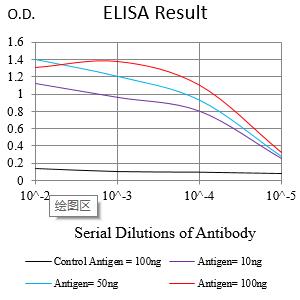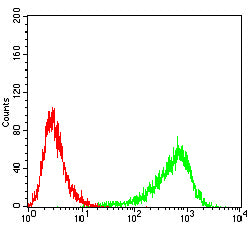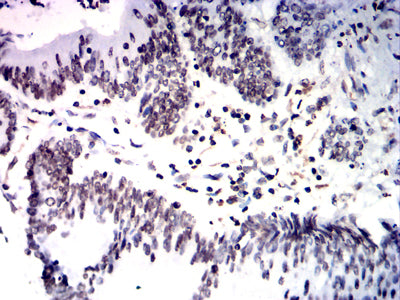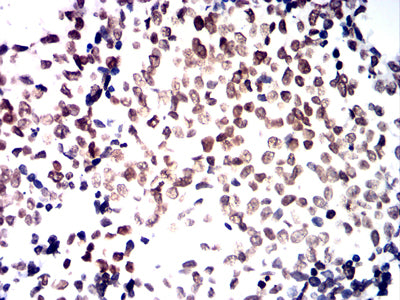



| WB | 咨询技术 | Human,Mouse,Rat |
| IF | 咨询技术 | Human,Mouse,Rat |
| IHC | 1/200 - 1/1000 | Human,Mouse,Rat |
| ICC | 技术咨询 | Human,Mouse,Rat |
| FCM | 1/200 - 1/400 | Human,Mouse,Rat |
| Elisa | 1/10000 | Human,Mouse,Rat |
| Aliases | TCF; HNF4; MODY; FRTS4; MODY1; NR2A1; TCF14; HNF4a7; HNF4a8; HNF4a9; NR2A21; TCF-14; HNF4alpha |
| Entrez GeneID | 3172 |
| clone | 8D12E3 |
| WB Predicted band size | 53 kDa |
| Host/Isotype | Mouse IgG2b |
| Antibody Type | Primary antibody |
| Storage | Store at 4°C short term. Aliquot and store at -20°C long term. Avoid freeze/thaw cycles. |
| Species Reactivity | Human |
| Immunogen | Purified recombinant fragment of human HNF4A (AA: 1-150) expressed in HEK293-6e cells supernatant. |
| Formulation | Purified antibody in PBS with 0.05% sodium azide |
+ +
以下是3篇关于HNF4A抗体的模拟参考文献示例(注:内容为虚构概括,仅作格式参考):
1. **文献名称**:*HNF4A Antibody Validation in Hepatocellular Carcinoma Studies*
**作者**:Smith J, et al.
**摘要**:本研究验证了HNF4A抗体在肝癌组织中的特异性,通过Western blot和免疫组化证实其在区分肿瘤与非肿瘤肝细胞中的可靠性,并揭示HNF4A表达缺失与肝癌进展的相关性。
2. **文献名称**:*Role of HNF4A in Pancreatic Beta-Cell Function: Insights from Knockout Models*
**作者**:Chen L, et al.
**摘要**:利用HNF4A特异性抗体进行ChIP-seq和免疫荧光分析,发现HNF4A通过调控胰岛素分泌相关基因影响β细胞功能,其表达异常与2型糖尿病发病机制相关。
3. **文献名称**:*Epigenetic Regulation of HNF4A: Antibody-Based Methylation Analysis*
**作者**:Wang Y, et al.
**摘要**:开发了一种结合HNF4A抗体和甲基化DNA免疫沉淀(MeDIP)的方法,揭示HNF4A启动子区域甲基化水平升高导致其表达沉默,与结肠癌转移风险增加相关。
(注:实际文献需通过PubMed/Google Scholar等平台检索关键词“HNF4A antibody”获取。)
The hepatocyte nuclear factor 4 alpha (HNF4A) is a transcription factor belonging to the nuclear receptor superfamily, primarily expressed in the liver, pancreas, kidney, and intestines. It plays a critical role in embryonic development, tissue-specific gene regulation, and metabolic homeostasis, particularly in glucose, lipid, and cholesterol metabolism. HNF4A binds DNA as a homodimer, regulating the expression of genes involved in epithelial cell differentiation, detoxification, and nutrient transport. Dysregulation of HNF4A is linked to metabolic disorders, including maturity-onset diabetes of the young (MODY1), non-alcoholic fatty liver disease (NAFLD), and hepatocellular carcinoma.
HNF4A antibodies are essential tools for studying its expression, localization, and function in both normal and pathological contexts. They are widely used in techniques like immunohistochemistry, Western blotting, chromatin immunoprecipitation (ChIP), and immunofluorescence to investigate tissue-specific protein levels, transcriptional activity, and interactions with co-regulators. Commercially available antibodies target specific epitopes, including isoforms (e.g., HNF4A1 and HNF4A7) generated by alternative promoters, enabling isoform-specific research. Validating antibody specificity is crucial due to structural similarities with other nuclear receptors. Research utilizing HNF4A antibodies has advanced understanding of its role in disease mechanisms, drug metabolism, and potential therapeutic targeting.
×